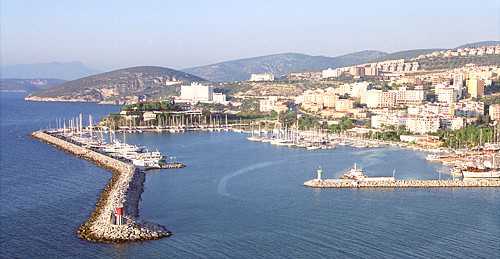Unlike Straight Talk in Asia Trip, Caution Rules Mideast and Europe Visits
The Washington Post Company
By Glenn Kessler
Secretary of State Hillary Rodham Clinton, flanked by hosts Pinar Kur, at far left, Mujde Ar, second from left, and Cigdem Anad, second from right, attends a talk show in Ankara, Turkey. (Pool Photo By Osman Orsal Via Associated Press)
ANKARA, Turkey, March 7 — When Secretary of State Hillary Rodham Clinton meets with foreign officials, the initial welcome is formal, as in “Greetings, Madame Secretary.” But invariably, the officials slip into calling her “Hillary” — a global brand name on par with “Diana” or “Tiger.”
Clinton’s celebrity status — and her skill at exploiting it — were again apparent during her first visit as secretary to the Middle East and Europe this past week.
At a private dinner with European foreign ministers in Brussels on Wednesday, she was the center of attention, patiently answering questions from her counterparts — who took the unusual step of bursting into applause after the meal.
When she spoke to hundreds of young political activists at the European Parliament on Friday, President Hans-Gert Poettering gushed that there is “enormous goodwill toward you” in Europe. He later paid her what he probably considered the ultimate compliment — that her answers “mostly could have been said by Europeans.”
But compared with her visit to Asia last month, this trip had a different diplomat on display.
In Asia, Clinton generated headlines with frank remarks, such as when she questioned the efficacy of sanctions against the repressive junta in Burma, spoke openly about a possible succession crisis in North Korea and said she expected to make little progress on human rights in China.
This week, she was more cautious, especially in the Middle East. She was often careful to hew to talking points, and her answers to reporters’ questions were more opaque. She also was less available for sustained give-and-take with the reporters traveling with her. Not counting short news conferences, she conducted one briefing for reporters on her plane in seven days of travel.
In Israel, she never publicly mentioned long-standing U.S. concerns about settlement expansion in Palestinian territories. When questioned about settlements in Ramallah, on the West Bank, she avoided uttering a word that might have upset Israeli leaders: Instead of “settlements,” she referred to “that issue.”
Clinton conducted no interviews with Israeli media, even though secretaries of state generally take time to meet with Israeli reporters. Nor did she meet with Palestinian reporters; instead, she met with a group of high school students, who asked her mostly personal questions.
But, in contrast to the “listening tour” of Asia, Clinton was much more diplomatically active. Throughout the week, she engineered an effort to reach out to nations, especially adversaries, that the Bush administration had spurned.
She dispatched two senior U.S. diplomats to meet with top Syrian officials on Saturday; she extended an invitation to Iran to be part of an international gathering on Afghanistan; and she tried to “reset” relations with Russia by winning NATO approval to restore high-level meetings and by having dinner with her Russian counterpart.
In each case, Clinton said she would look for areas in which the countries could work with the United States, while acknowledging and confronting topics of disagreement.
“We are being extremely vigorous in our outreach because we are testing the waters, we are determining what is possible, we’re turning new pages and resetting buttons, and we are doing all kinds of efforts to try to create more partners and fewer adversaries,” she said on National Public Radio.
Clinton also had to soothe allies unnerved by some of these moves. Arab and Israeli leaders are worried about the outreach to Iran, while Eastern and Central European countries are wary of potential deal-making with Russia on missile defense.
By week’s end, Clinton could claim progress, at least in terms of process. In Syria, Foreign Minister Walid al-Moualem and other officials met for about four hours with Acting Assistant Secretary of State Jeffrey Feltman and White House official Dan Shapiro. “We found a lot of common ground today,” Feltman told reporters in a conference call from Damascus. “It is my view that Syria can play an important and constructive role in the region.” But he added, “The differences between our two countries will require more work.”
At a news conference Saturday in the Turkish capital, where she held talks with Turkish officials, Clinton said it was too soon to say whether the United States would send an ambassador to Syria for the first time since 2005.
But she emphasized that the administration will press for peace talks between Israel and Syria, saying that the “importance of this track cannot be overstated.” Turkey last year brokered indirect talks between Israel and Syria, but the Bush administration stayed aloof from that effort.
n Saturday, Iran responded positively to Clinton’s plans to invite it to the conference on Afghanistan, an overture that could bring the secretary face to face with her Iranian counterpart by the end of the month. “The U.S. and global powers have realized that the issues in Afghanistan cannot be solved without the presence of the Islamic republic,” Gholam Hossein Elham, a spokesman for the Iranian government, told reporters in Tehran.
The dinner meeting in Geneva on Friday with Russian Foreign Minister Sergei Lavrov yielded no breakthroughs on arms control, missile defense or other thorny issues. But the atmospherics were strikingly different than Lavrov’s often-stormy sessions with Clinton’s predecessor, Condoleezza Rice.
“I hope Hillary will agree with me,” said Lavrov after the two diplomats emerged from the dinner. “I venture to say we have a wonderful personal relationship.”


